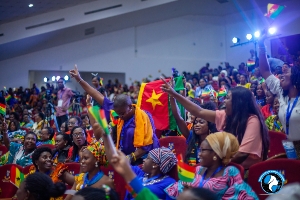 Some personalities at YAWC Network event
Some personalities at YAWC Network event
The Young African Women Congress (YAWC) Network is set to embark on a 20-day advocacy campaign against female genital mutilation themed “Do Not Cut Her”, from Wednesday 21st February to Monday 11th March 2024.
Female genital mutilation (FGM), also known as female circumcision or female genital cutting, is defined as the partial or total removal of external female genitalia and injury to the female organs for cultural, religious or non-medical reasons, entrenched in gender inequality, and discrimination.
According to UNICEF, approximately 200 million girls and women alive today are believed to have been subjected to female genital mutilation. Relief Web further reports that 80 percent of these cases are found in Africa with Somalia registering the highest percentage of victims (98% of women and girls aged 15 – 49 years).
The United Nations Fund for Population Activities (UNFPA) posits that nearly 4.4 million girls – more than 12,000 a day – are at risk around the world and unless efforts to end this practice intensify, the number of girls at risk is projected to rise to 4.6 million in 2030.
In a research article published by the BMC Women’s Health, although the overall prevalence of FGM in Ghana is 4%, studies have shown that the prevalence varies by region and is widespread in Northern Ghana.
The article further posits that in the Upper East region, clinical research revealed an overall prevalence of 38% with Bawku municipality recording the highest at 82%.
It is hypothesized that the higher prevalence of FGM in Northern Ghana resulted from the mixture of the people and culture of Northern Ghana with those of the neighboring countries of Mali, Togo and Burkina Faso, where the practice is more common.
This torturing procedure has physical and psychological lifelong effects including health complications like severe infections, chronic pain, depression, infertility, and sometimes death.
It can severely impact the sexual and reproductive health of women and girls and expose them to a high risk of postpartum haemorrhage, fetal death, obstructed labour, and HIV infection. On the other hand, the psychological effects of FGM are insidious and long-lasting. Residual trauma can lead to behavioural issues in children, debilitating anxiety, stress, and sexual dysfunction among female victims.
Against this background, the YAWC Network which has been at the forefront of the women empowerment agenda in all spheres of Africa over the last 8 years, made significant strides in transforming the lives of women, influencing policy and positively impacting society as a whole, is embarking on a 20-day unified campaign within its National Chapters across the African continent to strongly denounce this global plague which continues to undermine the rights of young girls and women in Africa thereby constituting a stumbling block to the advancement of gender equality and achievement of the full potentials of young girls and women.
The overall goal of the campaign is to Raise global awareness of the negative impacts of FGM on young girls and women as an act of human rights violation that continues to perpetrate gender inequality thereby limiting victims from achieving their full potential.
It is hoped that at the end of the campaign; YAWC Network will position itself as a key actor in eradicating this global ill. Men, boys, older women, and traditional authorities who are often the perpetrators and beneficiaries of this act will be fully sensitized and engaged as actors of change, and synergies will be created with women- and survivor-led organizations to combat and eradicate this menace effectively.
The YAWC network maintains that female genital mutilation is a barbaric, outmoded, and criminal cultural/religious practice against girls and women and needs to be stopped now!